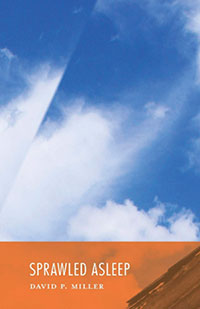 *
*
Review by Off the Shelf Correspondent Dennis Daly
Too often contemporary poetry dwells on the versifier rather than the verse. The confessional reigns and the uniqueness and self-importance of the poet drives both the narrative and the music. In the worst and most extreme examples of this navel-gazing art the poet and his readers develop an unhealthy bond of elitism, which separates them from any objective world view and renounces the joy of detail shared by soulful creation.

Sprawled Asleep
By David P. Miller
Nixes Mate Books
|Nixesmate.pub/books Allston, Massachusetts
ISBN: 978-1-949279-21-4
70 Pages
David Miller’s first full length book, Sprawled Asleep, does not do this. Its meditations are directed by an exactness of observation that deemphasizes the poet-observer to the point of irrelevance. As this poet-observer fades, his objects achieve a singular, eye-opening clarity that leaves one somewhat stunned. The motif in which this observer delineates his objects is often mass transportation. Alienation, counter intuitive as usual, finds a niche here.
In his poem Look at the Sky, Miller seeks word precision in his atmospheric scan. He does identify the observer’s position as in a bus, his intellectual preparation (it doesn’t take), and his sensory limitations. The piece opens with directness,
Pinned and plunging beneath the flat
of a thunderhead, a thick purple-
bruised ceiling more threatening
than night’s translucent black.
The bus scrambled out
from beneath that dark table,
toward the blue shelf
opened at the horizon.
I can write thunderhead. Or write
these: horsetails, lenticular,
buttermilk sky. What I want:
to exhale ah! Altostratocumulus.
To know the mundane sky
direct as knowing the breath.
No study or action of mind.
Gaze, or Don’t, Miller’s poem of humorous denial or, perhaps, faux resurrection, triumphs with deadly accurate observations and deductions. The poet considers the life or death evidence pertaining to an unmoving sedentary elderly man attracting some attention from his fellow travelers on the subway. A determination is made in the heart of the poem,
Men in shirts of Egyptian cotton,
suede shoes of charcoal grey,
slumped at the railings in end seats,
chins at their chests, wide woven hats
upside down at their feet,
are: asleep.
Asleep at the end
of the line and asleep
when the train switches back.
Sleeping for us who gaze, or don’t
at scaly red arms, the flushed crown
of a head, smart slim-fit jeans.
See his fingers are twitching.
Miller zeroes in on the mass of humanity in his poem Landscape with Hilton. He opens with the portrait of an elderly female beggar holding a paper cup in a wash of playgoers exiting a theatre. His action then moves to his well-drawn sketch of a waitress in a Faux-Fifties restaurant and past door men ushering a wealthy man to a taxi. This stratified jumble of society mixes in just the right way to elicit the connective Aha of memetic recognition. Next the poet surprises by etching historical contexts into the denouement of his urban landscape. The poem concludes this way,
Slide one block to the Tenderloin—
pale block letters against brick
remember Elegantly Furnished Rooms
Private phones Steam Heat
Hot Water Elevator Service
Private Baths $20 Month.
Above the sidewalk, a voided sign
for a vanished café, shaft rising
toward Corinthian columns and satellite dish,
overpainted entirely in white.
Taking one step beyond his usual ruminations, Miller’s deadpan tone of “just the facts, Ma’am” becomes almost Kafkaesque in his piece entitled Someone Else’s Daughter. Time in this strangely enclosed dimension intertwines with movement and thus with breath. The mode of transportation becomes more real than the travelers, who are reduced to mere passersby status. Instinct drives knowledge. Consider these lines,
The same train on the same rail
enters the same tunnel. Two faithful
train-on-track tones: the upper
thickens as tunnel walls resound
overtones against the body. Remember
how your dog always sat up when the Rambler
slowed, two turns before the house?
The train returns to open air and you rise,
Open eyes, the dog coming home.
My favorite piece in this extraordinary collection Miller entitles Another Poem About Fireflies. But this is not your generic firefly poem straining to connect the microcosm with the macrocosm. Instead Miller’s delightful meditation happens after he is drawn onto his porch by a misconception. He thinks he hears a soft rainfall or drizzle, but the basis of his sensory perception is rather the sound of leaves caught in an air draft. Nature sometimes surprises and this confused state can illuminate other mysteries. The poet notices how his objects assume a fuller reality as his perception withdraws. They dominate this shared world, and, to some extent, dispossess mankind. The poet describes his irrelevance,
I don’t remember when I last saw
fireflies, and I don’t know if I will ever
see them again. So stark, their white-yellow signals
pull from deep in the yard across the street,
and down the street. Each its own light-
point cycle, so many aerial lighthouses.
Flash cycle nebula densing the more
the more I abandon eye focus. This erratic
point cloud beneath tides of treetops,
and me in the fade to black…
The abnegation of self becomes an exquisite meditation and more in the collection’s concluding poem, Half the Day is Night. On the surface an ode to autumn’s equinox, the piece delves into eternal stillness. The poet outdoes himself in these lines,
I sit outside this dark September night.
The hand of dusk across my heart, my spine
caressed by stillness. The listening to come
to what there is to hear when nothing is to hear.
Miller’s remarkable poems lead us beyond his uncommon, well-wrought observations. They verge on the ethereal and visionary. Sprawled Asleep deserves serious artistic acclamation.















Reader Comments